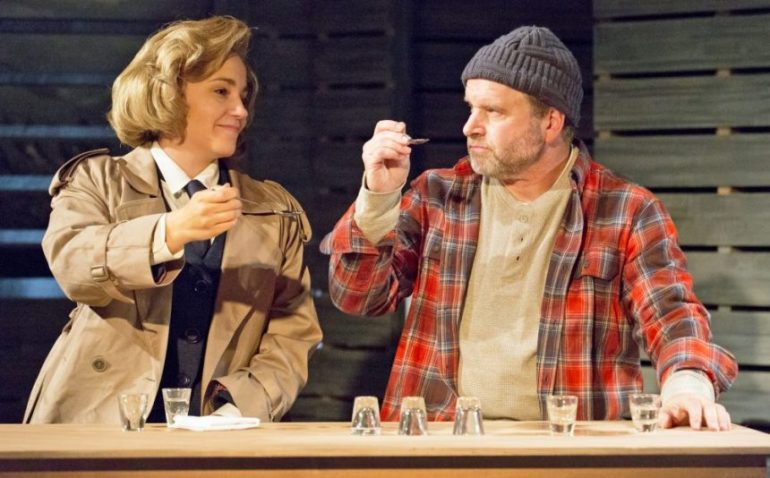
Red Herring. A romantic comedy by Michael Hollinger. Act II Playhouse, Ambler PA.
Red Herring is Michael Hollinger’s most intricate play. His script juggles a spy drama, three romances, a spoof of film noire and a critique of 1950s American politics. This unfolds with humor and a clever ending.
It is 1952; specifically the weeks leading up to election day. Dwight Eisenhower is campaigning for president; America is about to test the H-bomb in the South Pacific. And in this script, Senator Joe McCarthy’s daughter (Eileen Cella) just got engaged to a Soviet spy while a Boston detective (Rachel Camp) needs to find out who dumped a dead guy in the harbor. Meanwhile, her FBI boyfriend (Charlie DelMarcelle) is investigating a Russian spy ring and their two cases collide. When the detectives become aware of Miss McCarthy and her fiancé, things get even more complicated. Waters get choppy, you might say, as boats and relationships spring leaks.
One of the playwright’s best speeches compares marriage to a dory, a lightweight boat with a flat bottom which a couple must continue to bail in order to stay afloat: “All marriages have leaks. If you see leak, and both say ‘Let the other one bail out the water,’ you both drown.”
While Red Herring is most obviously a take-off of film noire, the play also uses a multiplicity of eccentric characters that are reminiscent of You Can’t Take It with You, the 1936 comedy by Moss Hart and George S. Kaufman, which also had FBI men and a Russian in its story.
A “red herring” is a falsehood that intentionally misdirects people from the truth. It is often used in detective fiction, and it acquired a second meaning in 1952 when President Truman called McCarthy’s accusations of communists in government a red herring — that era’s version of “fake news.” The term even has a third meaning because Commies often were known as Reds.
A huge number of plot details are juggled, and cast members are given multiple roles during 23 scene changes. I suspect that the playwright intentionally cluttered events as a challenge to actors and audiences and, thus, to give us a happy feeling of relief when things are sorted out in the end.
The 2000 premiere at Philadelphia’s Arden Theater featured Jennifer Childs and Scott Greer as the romantic detectives and Tony Braithwaite as the young spy. Here those parts are well played by Rachel Camp, Charlie DelMarcelle and Patrick Romano. Eileen Cella is the sepposedly-innocent Lynn McCarthy (and other small parts), Hayden Saunier is Lynn’s puritanical mother, a scheming landlady and a bridal shopowner; David Ingram is a Russian spy plus a henpecked husband, and Romano hilariously doubles as a priest.
Hollinger’s dialogue is crisp and his jokes are snappy. He makes fun of McCarthy’s red-baiting, as we hear the senator accuse a witness of leading a Communist anthem when he sang “When the red, red robin comes bob, bob bobbin’ along.” He also skewers hypocrisies in marriage: “A wife’s job is to keep her secrets, and find out her husband’s.”
Two people are sitting in a bar:
“Why are you drinking vodka from a spoon?”
“When I use a fork it spills on my lap.”
The romance of three unlikely lovers adds heart to this madcap adventure, in a fine production directed by David Bradley. Colin McIlvane’s dockside set is efficient while Christopher Colucci’s sound design mixes sinister sound effects and Rodgers & Hammerstein tunes from South Pacific.